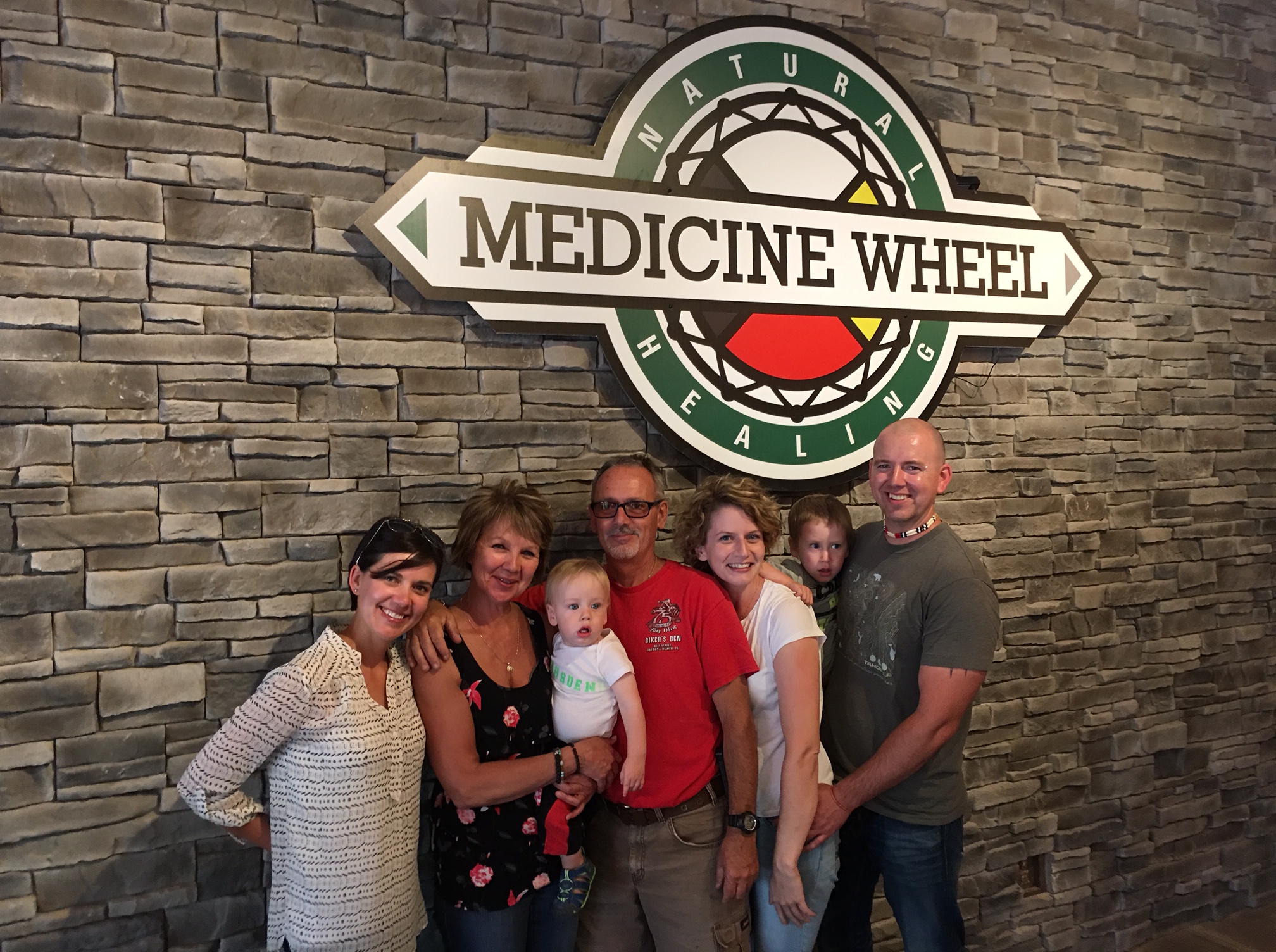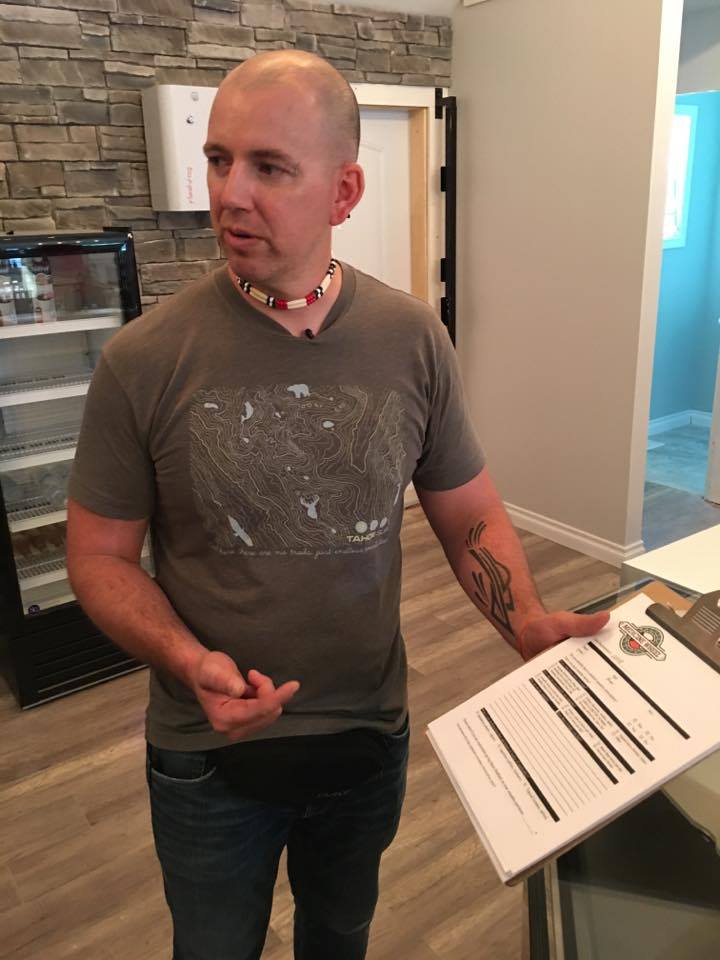“This is the future” – Medicine Wheel Natural Healing
By Tom Keefer
The revolution in natural Indigenous healing associated with the cannabis plant has taken another significant step forward. Readers may be familiar with the booming medical cannabis industry in Tyendinaga Mohawk Territory, where there has been an explosive growth of Indigenous run cannabis dispensaries.
That movement has inspired Rob Stevenson, an Anishinaabe man of the Bear Clan belonging to the Alderville First Nation, to launch his own business – the first Indigenous medical cannabis dispensary outside of Tyendinaga – on June 21, 2017.
Medicine Wheel Natural Healing offers a wide range of products. This includes an array of different cannabis flowers including sativa, indica, and many specialized hybrids. The store also has different kinds of shatter, rosin, oil, distillates, gummies, tinctures, syrups, and vape pens. They also have an assortment of different edibles.
Stevenson has also brought in other natural indigenous medicines such as bear grease, marshmallow root, and arnica to the store. As he puts it, “It’s all about being natural – and this is much more than just about cannabis – we want to be all encompassing about all natural health solutions.”
Although the grand opening celebration and the party are yet to come (stay tuned for details), Stevenson did a ‘soft launch’ for the facility – located at 8986 County Road 45 Roseneath K0K 2X0 in Alderville First Nation – on June 21, 2017.

Rob Stevenson and his family.
A family affair
The 21st of June is an auspicious day for Stevenson, not only because it is the summer solstice and National Aboriginal Day, but also because it is his birthday. The 37-year old’s tight knit family were present for the occasion, and are very supportive of his endeavour.
Rob’s mother Charlene works for a local woman’s shelter. She is proud of the work that her son is doing. With her daughter working as a physiotherapist, and with her son establishing the clinic, Charlene knows that her family is committed to helping their community to heal. As she puts it, Rob’s latest effort is about “healing the community and making us better as a whole – in mind, body, and spirit.”
Rob’s father Glen runs the family business, Stevenson Building Products, and has spent the last several months working with his son to completely renovate the new home of Medicine Wheel. Glen is also a big believer in his son’s cause.
Launching into an impassioned description of the benefits of the cannabis plant, Glen stated that, “sharing of knowledge and information is really what it’s all about. We’re coming out of the dark ages; cannabis has been suppressed for too long. I think if people take the time to research the plant, they will find that it provides huge benefits for human beings. Education and talking about it will take the stigma away.”
Glen added, “This plant should be respected. There are so many ways it can help people from making fiber, building products, plastics, etc. These are exciting times, to say the least.”
The results of Glen and Rob’s work in renovating the new facility is remarkable. The Medicine Wheel building is a brightly lit and spacious chalet with big windows and a decidedly clean and modern look and feel. The two main interior walls are made with dry stack Fusion Stone which gives the inside a natural feeling of protection and safety. The building itself has been carefully renovated to meet all security concerns. Indeed, aside from Tim Barnhart’s new headquarters for Legacy 420 in Tyendinaga, Medicine Wheel is hands down the best looking and most professional cannabis dispensary in ‘Indian country.’

The entrance to the Medicine Wheel store.
Origins of the business
Stevenson has long had an interest in the cannabis plant and its healing properties. In the fall of 2016, he was in the process of establishing the Smoke Signals Seed Bank specializing in high-grade cannabis seeds.
Then Stevenson caught wind of what the Mohawks were doing in Tyendinaga. In January of 2017, Stevenson saw the invite to the founding meeting of the National Indigenous Medical Cannabis Association. Intrigued by the group’s mandate of encouraging “the self-regulation of the Indigenous Medical Cannabis Industry through the application of Indigenous political and economic principles,” he decided that he had to come and see for himself.
Because the Canadian government showed no willingness to consult Indigenous peoples about their upcoming proposals for cannabis legalization, NIMCA decided that it wouldn’t wait around for Canadian approval, and proceeded proactively on the basis of Indigenous rights.
Energized by meeting with some 40 other Indigenous people looking for ways that cannabis as a plant could benefit their communities, Stevenson became active with the group and was soon nominated to a position as the Ontario Vice President of the Indigenous Medical Cannabis Association.
In that role, Stevenson worked to distil some guidelines and best practices from dispensaries already operating in Tyendinaga and learned as much as he could from the Tyendinaga dispensary model pioneered by Tim Barnhart and Legacy 420.
Stevenson wants everything in his business to be above ground and legitimate. Coming from a lifetime of activity with a successful family construction business, and surrounded by a great group of highly motivated and talented employees from his community, Stevenson is hoping to create a model that other indigenous people can use in their medical cannabis efforts.
“Anyone else who opens up a dispensary on this reserve, or any other reserve, I’m glad to share any of my information here. I’m documenting everything I’ve done, from security and renovations to training employees, product education and all that stuff. I’m willing to share all this information at no cost with the people willing to do this. The reason being, I want to see this done right, and I don’t want dispensaries to be seen in a negative light because people are doing them wrong.”
Stevenson wants to see the industry grow, and he welcomes competition and even the growth of other dispensaries in his home community. “There’s more than enough for every single person in my community to find opportunities to benefit from this industry and all of its related domains,” points out Stevenson.
Stevenson is also making sure that his new business is a win-win operation for the community. He notes that “we’ve hired seven full-time employees that reside on this reserve. We’re also giving a percentage of our profits back directly to the community by supporting different events, and contributing towards our local woman’s shelter and youth groups.”
Before he opened the store, Stevenson made a PowerPoint presentation to his local Band Council outlining the framework under which he was operating. According to Stevenson, “I’ve had a good acknowledgment of what we’re doing by Chief and Council, they are very supportive of it. I made a presentation to them outlining everything we wanted to do, our practices and protocols, and it was met with a lot of respect from Band Council. I made them aware of a lot of the benefits of cannabis that people may not know about.”

Rob Stevenson explains how the registration form works.
Protocols and Procedures
Before a customer can buy any product, they must first go to Medicine Wheel’s “consultation counter.” At the counter, they meet with a staff person and are required to fill out a one-page form about their medical history and relationship to cannabis. After identifying their need for cannabis, customers are provided with a membership card. The card is scanned into the point-of-sale system with all purchases, and this allows Medicine Wheel and the customer to track and monitor their medical progress. This could result in either increasing dosage or changing strains or using different products altogether.
All medical materials are kept in the strictest confidence. The aim, as Rob Stevenson puts it, is to “keep records of customers and what conditions they may have. We work with customers in consultations and keep track of what the different effects of the different strains are.”
Medicine Wheel’s primary incentive is not profit but helping people. Aware that they are functioning in the era of a new information technology economy, Stevenson seeks to operate their store on the cutting edge of medical technology.
That means using the internet as a learning tool, and seeking out “the cannabis experts emerging from the underground” as Glen puts it. The keeping of medical data and records for their patients, and using that medical data to help people and to advance what to date is an understudied field of medical learning, is a key part of this practice.
Rob Stevenson drives the point home. “We’re trying to set the standard. We are trying to show that you don’t need to be greedy and hoard all kinds of money. Put it back in the community. You get much more satisfaction by giving back to the community. You get to help people – and you really can’t ask for more satisfaction than that.”
The Medicine Wheel Healing Centre is located on Alderville First Nation 8986 county road 45 Roseneath K0K 2X0 just off of Highway 45, near the town of Roseneath. The Alderville First Nation is located on the south shore of Rice Lake. Peterborough is on the North side of the lake, Oshawa is to the west, and Coburg and Port Hope are due south on Highway 45. The store is open 11am-7pm, Tuesday through Sunday and closed on Mondays. Call anytime at (905) 352-3322.










